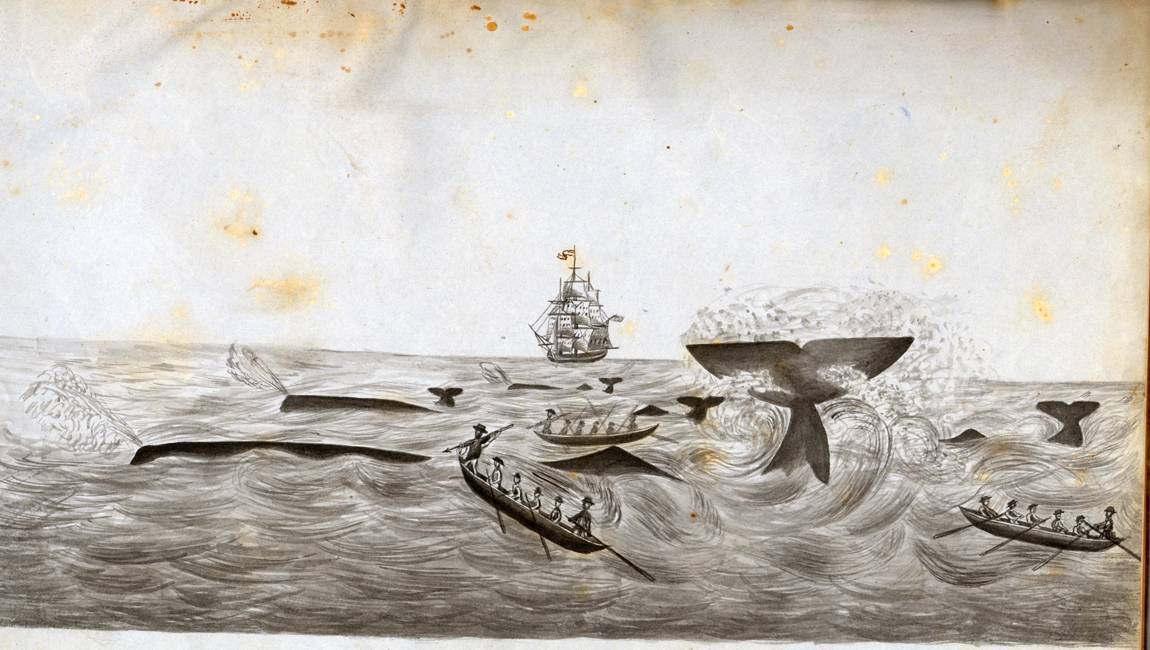The Beauty of Logbooks and Whalers’ Diaries
A combined archive, diary and travel novel, whalers’ logbooks offer an unequaled enchantment.
There is probably no whaling ship more famous than the Pequod, described inside and out by the pen of one of the most brilliant narrators ever to come from the United States, Herman Melville. Though not all whaling ships to sail from Nantucket carried with them writers as capable as the author of Moby Dick, it was still necessary that someone assume the obligatory accounting of work and days in the onboard logbooks.
The logs were a documentary record of the performance of the whaling ship as a factory at sea. In it were records of all the whales killed, of shipwrecks, of general weather conditions and other information of legal and commercial importance. But in the five logs preserved and exhibited at the Martha’s Vineyard Museum, each dating from between 1840 and 1860, are also shown details of an artistic and literary nature and to do primarily with the appreciation of life aboard a fishing boat.

Thanks to these logs we can glimpse for a moment the crews of the Iris, the Erie, the Rose Pool, the Independence and the Adeline Gibbs through their expeditions around the world. The museum’s efforts have focused on the conservation and restoration of the documentary materials as harsh weather conditions often affect them more than they would plain paper.
What worse, in their own time, the logs were appreciated no more than would be the records of an accountant today. The logs bear all sorts of inscriptions and markings, calculations and cutoff figures, but also expressive illustrations that reflect the nature of the whaling trade: long hours at sea in search of monsters.

There’s also a potential for scientific study in the review of these notes. For example, an understanding of the climatic and environmental conditions of the mid nineteenth century is usually the benchmark for statistical measurements of global warming today.

On a slightly less romantic note, in logbooks we can also see the impressions of human beings before the outbreak of the global era. As with Marco Polo or Christopher Columbus in their own times, adventurers aboard whaling ships were among the first to face radical otherness in distant peoples and cultures across the seven seas. Their logbooks provide a testimony to a time when the world was still immeasurably big, and their wonder was recorded in memories more so than images reproduced electronically.

Related Articles
Pictorial spiritism (a woman's drawings guided by a spirit)
There are numerous examples in the history of self-taught artists which suggest an interrogation of that which we take for granted within the universe of art. Such was the case with figures like
Astounding fairytale illustrations from Japan
Fairy tales tribal stories— are more than childish tales. Such fictions, the characters of which inhabit our earliest memories, aren’t just literary works with an aesthetic and pleasant purpose. They
A cinematic poem and an ode to water: its rhythms, shapes and textures
Here lies One Whose Name was writ in Water. - John Keats Without water the equation of life, at least life as we know it, would be impossible. A growing hypothesis holds that water, including the
Watch beauty unfold through science in this "ode to a flower" (video)
The study of the microscopic is one of the richest, most aesthetic methods of understanding the world. Lucky is the scientist who, upon seeing something beautiful, is able to see all of the tiny
To invent those we love or to see them as they are? Love in two of the movies' favorite scenes
So much has been said already, of “love” that it’s difficult to add anything, much less something new. It’s possible, though, perhaps because even if you try to pass through the sieve of all our
This app allows you to find and preserve ancient typographies
Most people, even those who are far removed from the world of design, are familiar with some type of typography and its ability to transform any text, help out dyslexics or stretch an eight page paper
The secrets of the mind-body connection
For decades medical research has recognized the existence of the placebo effect — in which the assumption that a medication will help produces actual physical improvements. In addition to this, a
The sea as infinite laboratory
Much of our thinking on the shape of the world and the universe derives from the way scientists and artists have approached these topics over time. Our fascination with the mysteries of the
Sharing and collaborating - natural movements of the creative being
We might sometimes think that artistic or creative activity is, in essence, individualistic. The Genesis of Judeo-Christian tradition portrays a God whose decision to create the world is as vehement
John Malkovich becomes David Lynch (and other characters)
John Malkovich and David Lynch are, respectively, the actor and film director who’ve implicitly or explicitly addressed the issues of identity and its porous barriers through numerous projects. Now










